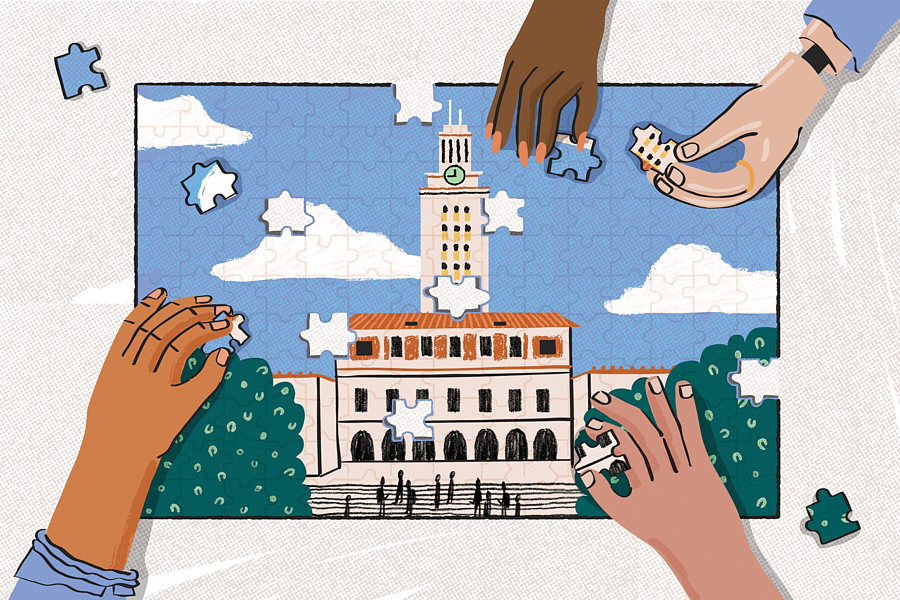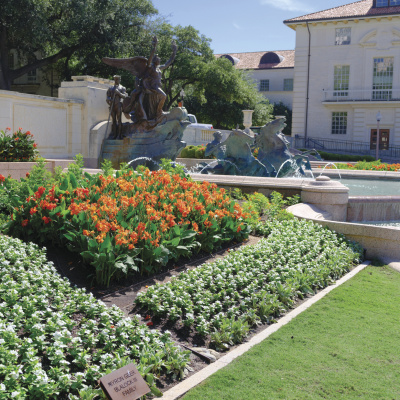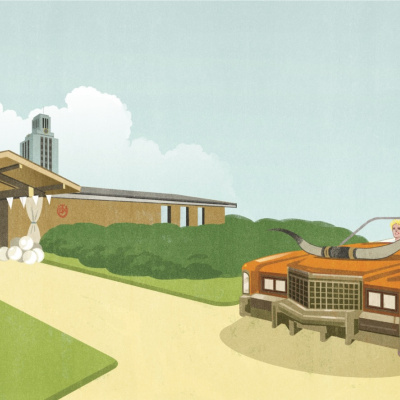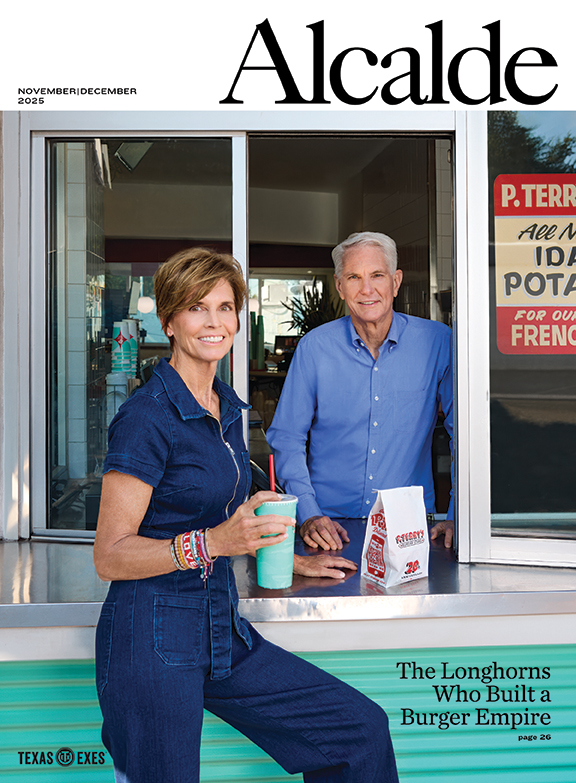Founding Director of UT's Disability Cultural Center Talks Campus Culture Shift

Emily Shryock has the rare perspective of having been a student, staff, and faculty member at The University of Texas. Relying on her master’s in social work with a focus on community and administrative leadership, she now teaches in the Critical Disability Studies program—and serves as the founding director of UT’s Disability Cultural Center. One of only 12 of its kind across the nation’s college campuses at the time of its founding, the DCC facilitates a sense of belonging and community for disabled students, who advocated for its establishment.
The Alcalde spoke with Shryock, MS ’15, Life Member, about the personal and professional significance of the new institution.
First of all, tell us about your journey to this unique position.
I’m originally from Indiana, and while I was getting my bachelor’s degree [at Indiana University–Purdue University at Indianapolis], I did an internship in their Disability Services Office, at the same time that my disability was progressing to the point that I needed to use accommodations—so that was a very formative time of being introduced to a new way of life and to the disability community. I had an associate degree in American Sign Language and Deaf Studies, so I finished that up with a broader focus in Disability Studies through an individualized major program.
I was also (and still am!) a wheelchair athlete, so when I graduated, I was recruited by the wheelchair rugby team here in Austin, and that was when I started working in [what was then] the Services for Students with Disabilities office in 2010. Now, it’s called Disability and Access. I was in a couple of different roles in that office until January of this year, when I started in this position as the director of the Disability Cultural Center.
This is an exciting opportunity and also, at times, a bit overwhelming! Thankfully, I’ve been able to rely on our campus and community partners, who were already doing a lot of this work, so even though in some ways we were starting from zero, there was already a strong foundation. I’ve been able to come in and really focus on promoting the work in one space at the DCC.

What exactly is the Disability Cultural Center?
I’ve gotten good at answering that question because people get really excited, and then they’re like, “Oh, wait, what actually is this?” We’ve been thinking about the DCC as a hub for disability, community, education, and advocacy. We’ve always had the Disability and Access office, which is focused on student accommodations and access, but we want to take a broader perspective on disability.
We will eventually have a physical space on the first floor of the Student Services Building that will provide that opportunity for folks to physically come together and build community—similar to UT’s Gender and Sexuality Center and the Multicultural Engagement Center. In the meantime, we’re hosting a lot of different events both in person and virtually to facilitate that community: workshops, book clubs, conversations.
We’re also working with campus partners such as Longhorn TIES, the autism and neurodiversity support group; the Texas Center for Disability Studies; and the Disabled Faculty Equity Council on connecting folks to opportunities for advocacy.
What is the significance of having a Cultural Center alongside the Disability and Access office?
A disability services office operates within a legal and medical view of disability. There are laws that protect the rights of people with disabilities to have access and accommodations. They often look at that from the medical model of, “What is wrong with you? What can’t you do, and how do we put accommodations in place so that you can do it?” … So a lot of students come in feeling like there’s something wrong with them.
Our disability office at UT has been moving more towards the social model, which [recognizes that] this campus was built without considering the different ways that people move through the world, whether that’s with a physical disability or somebody who is neurodiverse, so they are trying to address the physical and learning environments. But because they’re tied to that legal view, students must have documentation of their disability.
At the DCC, we are taking a much broader view of disability as being a culture, an identity. People aren’t required to prove a diagnosis to participate in events. Sometimes people may not feel comfortable or ready to identify with the word “disability,” or may not want or need accommodations. We have students who say, “I don’t really need anything modified in my educational or physical environment, but I’d still like to connect with a community of people who have similar lived experiences.” And that’s where the DCC comes in.
It also provides more of a space to prove that we can do better than just legal accessibility. That’s the bare minimum at this point.
What was the process of bringing the Cultural Center to UT?
In 2021, we started an informal working group of students, faculty, and staff to talk about why we wanted a DCC, what a DCC would look like at UT, what role it would play on campus. A student group put together a survey and gathered feedback from students, and then we used that data to create a proposal for the Disability Cultural Center.
Our first funding came from the Student Services Budget Committee, which is students determining what projects are going to be funded. And then we received additional funding through the You Belong Here strategic plan. I think that was really validating to receive that investment—not just a token, “Oh, that’s a good idea. Maybe someday,” but actual investment in the form of funding and space to be able to make this a reality. For our students, it was really exciting to realize the power their voices have. Institutionally, it sends the message that we value disability as more than just a compliance issue, but as something to be valued.
How do you foresee alumni engaging with the DCC?
One of my priorities has been starting a Disabled Longhorn Alumni Network because we knew that there were so many students who would have loved for this to be something that was available when they were here. We want to provide them with the opportunity to stay connected.
I’m also excited about reconnecting with alumni and using their expertise and connections to help benefit current students, who may know how to navigate their disabilities in an academic setting but could use advice or a friendly face within a professional setting.
Finally, all of the funding that we have at this point is termed funding. We eventually want to create scholarships and travel stipends, a library and a technology suite. So there are definitely development opportunities for those who want to financially support the DCC’s work.
What do you hope disability culture and community looks like on campus?
UT has a long and strong history of student advocacy within the disability community, but the culture has definitely shifted over time. There are now more people talking about disability, more people openly identifying as being neurodiverse or having a mental health condition or chronic illness, more openness to talking about that identity, and more designated spaces where these conversations are encouraged.
For some folks at UT, this is the first time they’ve ever met somebody who has a similar disability as them, so what was always an “othering” or isolating experience—now, all of a sudden, they’re in community. For students who are newly diagnosed, too, wandering through this sometimes strange, sometimes scary new world with a newfound community can be really helpful.
I’ve seen some of our strongest student leaders who, when they first came to UT, definitely were not in that place of confidence. If you had told them, “You’re going to graduate and have been the president of our student org or in student government,” they probably would never have imagined that. Having a Disability Cultural Center and reframing disability as part of your identity, part of the unique skills and strengths and life experiences that you bring, I think helps change the culture.
This interview has been edited and condensed.
CREDITS: Illustration by Lindsey Balbierz; photo courtesy of Emily Shryock






